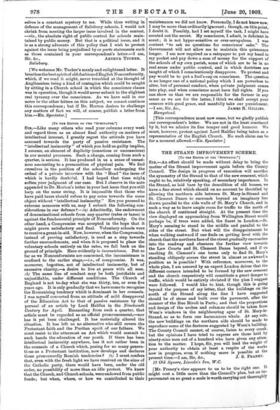[To THE EDITOR OF THE "SPE0TATOR-1 SIR,—Like many others who
read your columns every week and regard them as an almost final authority on matters of intellectual interest, I greatly regret the attitude you have assumed towards the party of passive resistance. The "intellectual insincerity" of which you hold us guilty implies, I assume, an element of duplicity (conscious or unconscious) in our mental processes. Such a charge, coming from such a quarter, is serious. It has produced in us a sense of uneasi- ness amounting to a premonition of physical pain. We find ourselves in the position of the schoolboy undergoing the ordeal of a private interview with the " Head " the issue of which is hardly doubtful. I had hoped that time might soften your judgment of our case. But I observe in the note appended to Dr. Horton's letter in your last issue that you still harp on the same string. It is impossible that those who have paid taxes should refuse to pay rates towards the same object without "intellectual insincerity." Ere you proceed to extreme measures with us, may I submit the following con- siderations in our defence ?—(a) Admittedly, the endowment of denominational schools from any quarter (rates or taxes) is against the fundamental principle of Nonconformity. On the other hand, a Compromise was accepted in the hope that it might prove satisfactory and final. Voluntary schools were to receive a grant-in-aid. Now, however, when the Compromise, instead of proving satisfactory, is used as a step towards further encroachments, and when it is proposed to place the voluntary schools entirely on the rates, we fall back on the ground of principle. Here evidently is inconsistence. But so far as we Nonconformists are concerned, the inconsistence is confined to the earlier stage,—i.e., of compromise. It was, moreover, begotten, not of intellectual insincerity, but of excessive charity,—a desire to live at peace with all men. (b) The same line of conduct may be both justifiable and unjustifiable, under different conditions. The Church of England is not to-day what she was thirty, ten, or even five years ago. It is only gradually that we have come to recognise the Romanising tendency which is dominant in her counsels. I was myself converted from an attitude of mild disapproval of the Education Act to that of passive resistance by the perusal of an article by Lord Halifax in the Nineteenth Century for April. Emanating from such a quarter, that article must be regarded as an official pronouncement,—nor has it yet been challenged. It has materially altered the situation. It has left us no alternative who atill revere the Protestant faith and the Puritan spirit of our fathers. We must resist to the uttermost an Act which would commit to such hands the education of our youth. If there has been intellectual insincerity, anywhere, has it not rather been in the counsels of a Church which, posing for so many genera- tions as a Protestant institution, now develops and declares these pronouncedly Romish tendencies P (c) I must confess that, even with the fresh light we have received on the aims of the Catholic party, there would have been, under the old order, no possibility of more than an idle protest. We knew that the Church, and Church schools, were endowed from public funds ; but when, where, or how we contributed to their maintenance we did not know. Personally, I do not know now. I may be more than ordinarily ignorant; though, on this point, I doubt it. Possibly, had I set myself the task, I might have scented out the secret. My conscience, I admit, is deficient in scent ; it is not hyper-sensitive or over-scrupulous. I was content "to ask no questions for conscience' sake." The Government will not allow me to maintain this quiescence longer. I am now required as a ratepayer to put my hand in my pocket and pay down a sum of money for the support of the schools of my own parish, some of which are to be in no real sense under public control, and in which doctrines are taught of which I conscientiously disapprove. To protest and pay would be to put a fool's-cap on conscience. The question is no longer one of a national policy which I am powerless to alter, but of personal conduct, when private judgment comes into play, and when conscience must have full rights. If you can show us that we are responsible for the former in any sense as we are for the latter, I think we shall accept your censure with good grace, and manfully take our punishment.
[This correspondence must now cease, but we gladly publish our correspondent's letter. We are not in the least convinced by it, but we admire its fine temper and good humour. We must, however, protest against Lord Halifax being taken as a representative of the English Church. No such claim can be for a moment allowed.—En. Spectator.]










































 Previous page
Previous page